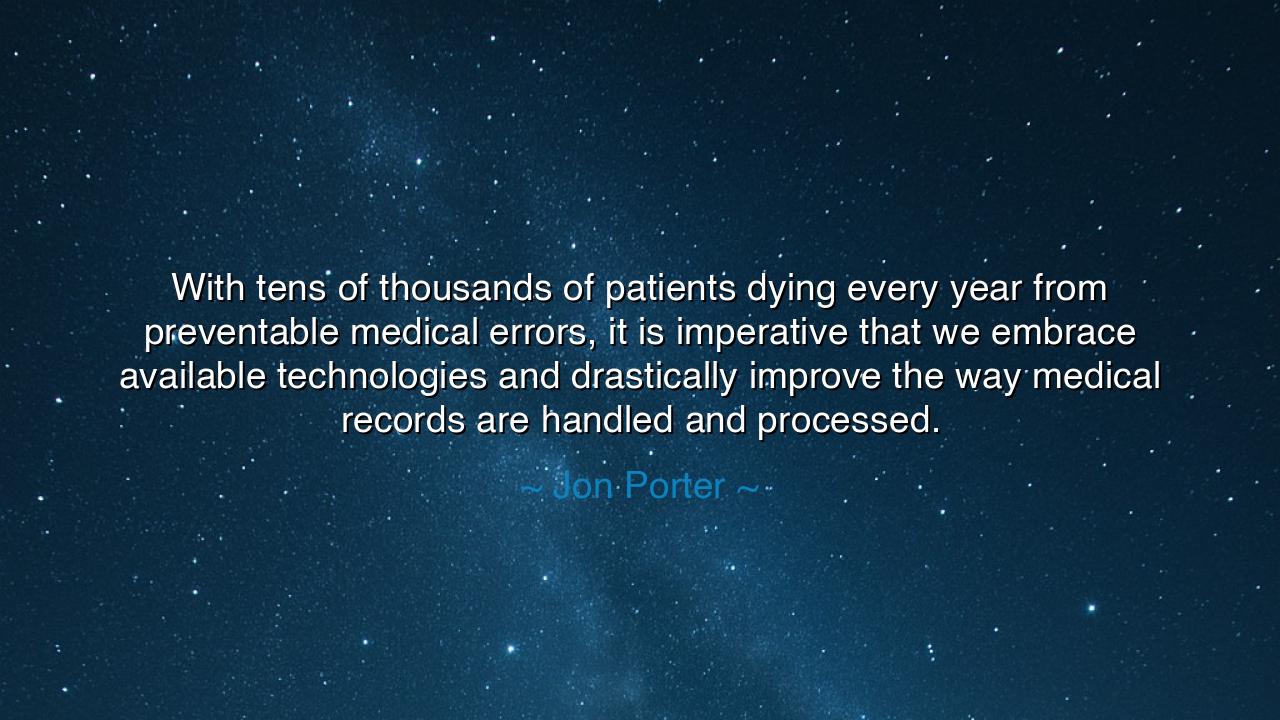
With tens of thousands of patients dying every year from
With tens of thousands of patients dying every year from preventable medical errors, it is imperative that we embrace available technologies and drastically improve the way medical records are handled and processed.






In the urgent words of Jon Porter, “With tens of thousands of patients dying every year from preventable medical errors, it is imperative that we embrace available technologies and drastically improve the way medical records are handled and processed,” we are called to confront a harsh reality: that medical errors, many of them preventable, continue to claim the lives of countless individuals each year. Porter’s words highlight the crisis in healthcare that demands not only awareness but immediate action. He underscores the pressing need to modernize the tools we use—specifically the way medical records are handled—to save lives and ensure that technology is employed to its fullest potential in healing, rather than contributing to unnecessary harm. In this call to action, Porter blends ethics with technology, urging that human lives should never be lost to systemic failures that can be remedied by innovation.
The origin of this quote arises from Porter’s awareness of the vast number of deaths that could be avoided with the proper use of technology in the medical field. In a world increasingly reliant on advanced technologies, the question arises: why are so many lives still lost due to preventable errors? A major contributing factor is the archaic nature of many of the systems used to manage medical records—systems that are fragmented, outdated, and prone to human error. Porter’s call is clear: we must embrace the digital age and use the tools available to transform healthcare into something that can better serve and protect the people it is meant to help. This is a call not just for change but for a moral imperative, recognizing that the technology to save lives is at hand, yet its potential is underutilized.
In the ancient world, great civilizations understood the importance of systems in maintaining order and life. The Romans, for example, built the first public health systems, using aqueducts and sanitation practices to ensure the health of their empire. The Greeks developed the Hippocratic Oath, recognizing that medical practitioners had not only the power to heal but the responsibility to do so with diligence and care. These civilizations knew that in order to thrive, they needed reliable systems that could manage the health of their people, systems that minimized risk and maximized efficiency. Similarly, in today’s age, we must turn to technology as the modern tool capable of transforming healthcare, ensuring that life-saving information is accurate, accessible, and effectively used to prevent unnecessary deaths.
Consider the story of Edward Jenner, the British physician who, in the late 18th century, developed the first smallpox vaccine. Before Jenner’s discovery, smallpox had claimed millions of lives, devastating populations around the world. Jenner, recognizing that prevention was the most powerful tool against disease, used scientific inquiry to craft a vaccine that would eventually lead to the eradication of smallpox. In the same way, the embrace of modern technologies in the medical field, such as electronic medical records and automated error-checking systems, represents a vaccine against the epidemic of preventable medical errors. Just as Jenner’s work changed the landscape of medicine by preventing death, so too can our use of technology in healthcare fundamentally alter the outcome of medical care.
Yet, while Jenner’s work was revolutionary, it was met with skepticism in its time. Some physicians resisted the idea of vaccination, clinging to traditional methods that had no scientific basis. The story of Jenner teaches us that resistance to change is a natural part of the process, but it must not stop progress. The same resistance can be seen today in the medical community when it comes to embracing new technologies. There are those who are hesitant to trust digital systems, fearing the loss of personal touch or the risks associated with data breaches. However, just as Jenner’s smallpox vaccine ultimately proved to be a life-saving breakthrough, so too can the digitization of healthcare offer solutions to the modern-day epidemic of preventable medical errors.
The lesson of Porter’s statement is both urgent and clear: innovation and technology must not be feared, but embraced. Just as Jenner used the tools of his time to prevent disease, we must use the tools of our time to prevent death. The technologies available today, particularly in the realm of electronic medical records, are capable of reducing errors, improving communication, and ensuring that medical professionals have the most accurate information available to make life-saving decisions. We must recognize that inaction in the face of these available tools is as irresponsible as denying the advances made in vaccination or surgical practices.
In our own lives, let us apply this lesson with purpose and resolve. Whether we are in the medical field or not, we can advocate for technological progress that benefits humanity. In our own spheres, we must understand that the use of technology can make our work more efficient, more effective, and more aligned with the principles of human dignity and well-being. Just as the ancients knew that building systems that protect and serve their people was essential to their legacy, so too must we dedicate ourselves to creating systems that safeguard the health and lives of those we serve. By embracing technology with an eye toward improvement, we honor the legacy of progress and innovation that has always been at the heart of human civilization.






AAdministratorAdministrator
Welcome, honored guests. Please leave a comment, we will respond soon